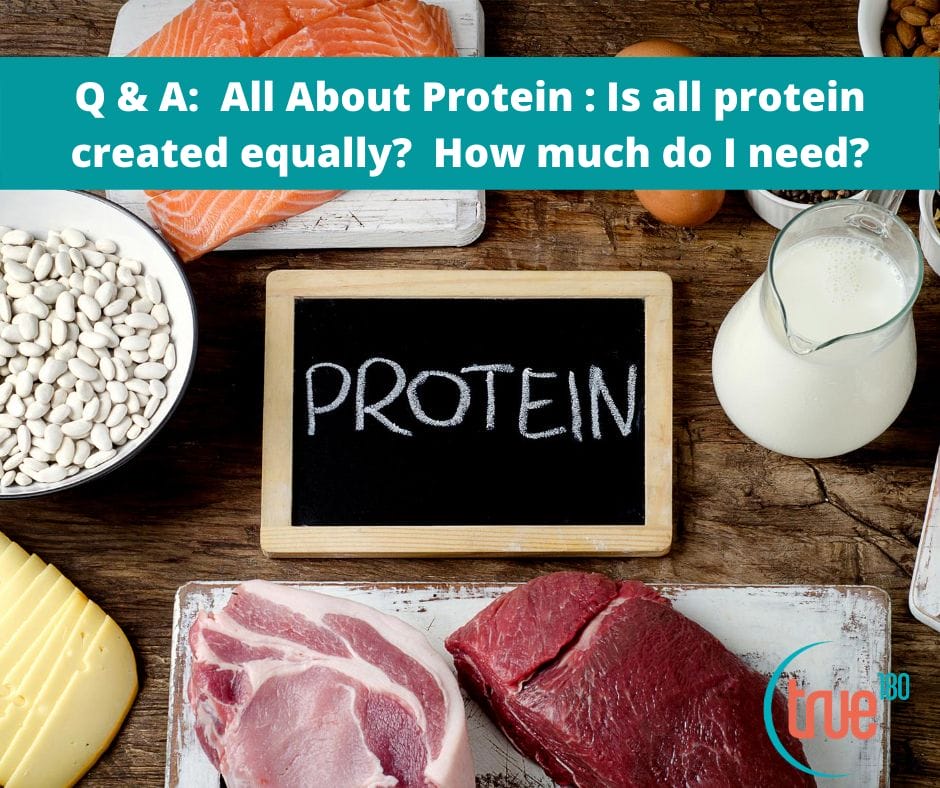| 🥩 Q & A: All About Protein : Is all protein created equally? How much do I need? 1a) How do I know how much protein I need? Most women need about 1 gram per pound of lean body mass. Within 80% of that number seems to be good enough for most people. The most accurate way to get your lean body mass is to do an InBody. Your most recent InBody, even if it’s kinda old will still be within 5-10%. In January you had 97lbs of lean body mass. So, 80% of that is about 80. If you’re not a client, then for most women multiply your body weight by .6, and if you are extra lean try .75. 1b) Does how much protein I need depend on what your goals are: weight loss, build muscle…? How much protein you need depends on your goals, age, genetics, however, we like to keep it simple. When you are trying to lose weight the goal is really to lose fat, and the key to losing fat and keeping it off is to preserve as much of your muscle mass as possible. Preserving your muscle mass while losing weight is about getting enough protein and getting strength training in at least 2 days per week. Muscle mass is, unfortunately, easy to lose and hard to gain – basically the opposite of body fat. Sad, but true. Without consistent strength training 50-60% of the weight people lose will not be fat, and that makes keeping the weight off much harder because your metabolism is slower. Protein alone will not preserve your muscle mass, only strength training + protein. The guideline above – within 80% of 1 gram per pound of lean body mass – will work well for most people for most goals. It’s the rest of the diet that shifts around. To lose weight: calories go down, and protein may need to go up a little bit if someone has a hard time hanging onto their muscle. To gain weight: calories go up, and with the extra calories you may or may not need extra protein. The guideline is a good place to start, and then use the InBody to check to see how your body is responding. If the numbers are what we wanted to see, then we stay the course, and if not, then we look at adjusting things… of course, the hardest part about nutrition is consistency, and it usually takes a while to get consistent enough to really answer the question “is this working?” 2) Chicken, eggs etc. are good sources of protein but… Are protein a good supplement when trying to ‘squeeze’ in extra protein? Do they provide same quality of protein as a ‘solid’ food source? Protein supplements can be a great way to add some extra protein into your diet. There are only 2 drawbacks: A. Sometimes the manufacturers cut corners and don’t put very much protein into their product. Lawsuits about this practice are pretty common. But, if you are taking a supplement consistently and your muscle mass looks good on the InBody, then it’s probably legit. However, if you think you’re getting enough protein because you are keeping track and the muscle mass is going down, then this usually means that brand of protein is no longer a good source. More on that here. B. Some people find liquid protein very unsatisfying. Sometimes when people are trying to reduce their calorie intake they find liquid protein sources leave them feeling like they didn’t eat anything. You know yourself, so you know if this is an issue for you or not. 3) I am really interested in this topic as I feel like I am lacking in protein dept. I love veggies, hummus, fruits not big on beef. Love Bocca Veggie Burgers-use 2 as the bun, each burger has 13g protein but I guess my real question is……is all protein created equally? Veggies, hummus and fruit are great sources of fiber and other good things, but not great sources of protein. However, many are surprised to find that many cuts of beef are also poor sources of protein. For example, a rib eye steak is primarily fat by calories. A 3.5oz rib-eye has 290 calories, and only 84 of those calories are from protein, while the other 206 – the other 71% – are from fat. It’s delicious fat, but still, way more fat than protein. Bocca Burgers are great – tasty, easy, low cal, decent protein… now that you mention it, I don’t remember why I stopped eating them. We get a lot of vegetarian clients, and we always reassure them that you do not need to eat meat to reach your protein goals. Egg whites, fat-free dairy (Greek yogurt, cottage cheese, etc.), and bean sources (Bocca, lentils, etc.) will provide everything you need. Protein quality does vary, but, with rare exception, only strict vegans need to put much thought into balancing incomplete plant proteins. |

